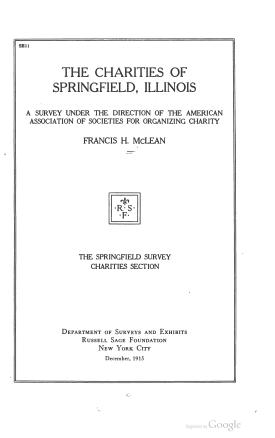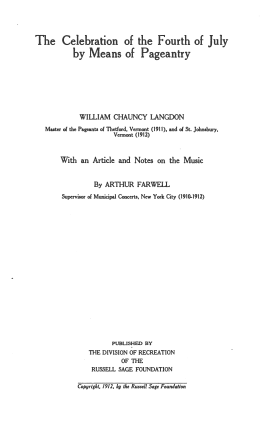
The Charities of Springfield, Illinois
About This Book
A volume of the Springfield survey of 1915. Published by the Department of Surveys and Exhibits of the Russell Sage Foundation.
FRANCIS H. McLEAN, Family Service Association of America.

A volume of the Springfield survey of 1915. Published by the Department of Surveys and Exhibits of the Russell Sage Foundation.
FRANCIS H. McLEAN, Family Service Association of America.
Presented at the fifty-first congress of the American Prison Association in 1921, this paper presents the structure of the Westchester County Penitentiary, whose prisoners are employed on the farm the penitentiary rests on. It argues that, instead of being a liability to the county, the prison is an asset, and that, instead of being a place of punishment, it is a training school that returns its wards to society as better men because of their experiences on the farm. Key to this system is that the prisoners are self-governing through a method of classification and rewards that is outlined in detail in this paper.
V. EVERIT MACY was commissioner of public welfare, Westchester County, N.Y.
An analysis of how organized charities can work efficiently to best treat families in need in regards to health, education, employment, recreation, and spiritual development.
PORTER R. LEE was general secretary of the Philadelphia Society for Organizing Charity
The Russell Sage Foundation recently completed a major initiative to assess the effects of the Great Recession on the economic, political, and social life of the country. Officially over in 2009, the Great Recession is now generally acknowledged to be the most devastating global economic crisis since the Great Depression. Prolonged economic stagnation is likely to transform American institutions and severely erode the life chances of many Americans. To understand these effects across a broad swath of social and economic life, the Foundation identified 15 areas of inquiry—such as retirement, education, income and wealth—and funded proposals for innovative projects from a distinguished team of scholars.
Three new Recession Briefs summarizing research from the Great Recession initiative now are available for download. These reports use data from the Fragile Families and Child Wellbeing Study (FFCWS) in order to analyze the effects of the Recession on families in the U.S.:

Published by the Division of Recreation of the Russell Sage Foundation, this pamphlet presents a number of suggestions for a safe celebration of the Fourth of July. It includes notes on Independence Day music considerations by Arthur Farwell, then supervisor of municipal concerts for New York City.
WILLIAM CHAUNCY LANGDON was Master of the Pageants of Thetford, Vermont (1911), and of St. Johnsbury, Vermont (1912).
A volume of the Pittsburgh Survey, carried out by the Russell Sage Foundation in 1914.
PAUL UNDERWOOD KELLOGG was director of the Pittsburgh Survey.
A volume of the Pittsburgh Survey carried out by the Russell Sage Foundation in 1914, focusing on Pittsburgh's history and growth, civic conditions, and education, recreation, and institutional facilities.
PAUL UNDERWOOD KELLOGG was director of the Pittsburgh Survey.
Written by Alexander Johnson, a former inspector of almshouses, in 1911, The Almshouse: Construction and Management is a detailed look at the successful practices of various charity institutions around the world. The book also touches on several ineffective aspects behind badly managed almshouses witnessed by the author firsthand. Topics range from proper living-quarter design to mental health and to strategies for efficient administration. Drawing upon his experiences, as well as the reports of various state boards of charity, Johnson depicts what makes a well-managed, comfortable place for poor people to live in.
ALEXANDER JOHNSON was general secretary of the National Conference of Charities and Correction.
Prepared for the American Sociological Society in 1959, Sociology and the Military Establishment explores the relationship between the military and the possible contributions of sociologists, particularly after World War II. It argues for more effective utilization of sociological theory and research in the analysis of problems to the military and makes evident that research on military problems would provide extremely valuable opportunities for testing sociological theory and method.
MORRIS JANOWITZ was professor of sociology at the University of Michigan.